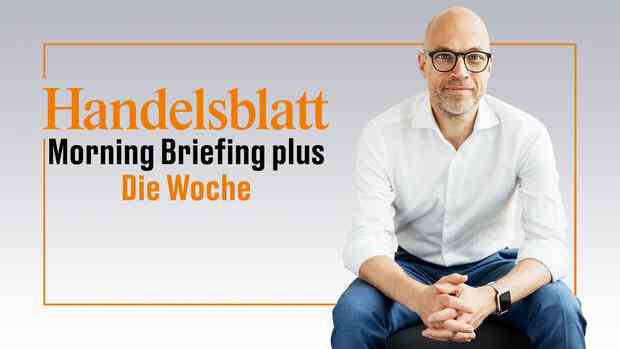welcome back to our shared look at the past week, ending on a day to remember. A year ago, Russia invaded Ukraine, which many politicians in Europe refused to admit until Russian troops marched across Ukraine’s borders. My colleague Jürgen Klöckner reported from Kiev at the time that he too was completely unprepared for the attack.
No one understands this better than the people of Ukraine, which our International Correspondent Mathias Brüggmann has visited in the past few weeks. In a moving report, he portrays a country torn apart: he meets a soldier who traveled home from the front for a few hours for the christening of his three-month-old baby, talks to young people who are looking for some normality between parties and air raids , and interviews entrepreneurs trying to keep their businesses afloat in the midst of war.
(Photo: Mathias Brüggmann)
But also our editors has changed due to the attack on Ukraine in order to best describe the disruptive developments after the outbreak of war and their consequences for the economy. International manager Nicole Bastian and her team deal with these new geo-economic challenges almost every day in a very recent podcast series that is well worth listening to.
These reports from all over the world we add new columnists and experts in the relevant fields. One of them is the former head of the Munich Security Conference, Wolfgang Ischinger; another is Claudia Major from the Science and Politics Foundation.
The Handelsblatt also has A team of reporters led by Martin Murphy has been set up to deal with security issues: in addition to an in-depth look at the armaments industry and defense policy, this also includes expertise in the field of virtual warfare and close contacts with intelligence services. We also have a new Eastern Europe correspondent in Mareike Müller, who observes from the Baltic States how the war is changing Europe.
What else kept us busy this week:
1. It was kind of an expected disappointment: A week ago in Munich, the Chinese chief diplomat Wang Yi announced that his country would develop a peace plan for the war in Ukraine. Then yesterday morning came the 12-point plan for a ceasefire and peace talks between the warring parties. A proposal that is already “dead upon publication,” say China experts, because it simply calls for a ceasefire, not much more. Meanwhile, the United States accuses the Chinese government of supporting Russia and even considering arms deliveries.
2. Things are a bit quieter in London at the moment. At least in the north of the city, where many Russian oligarchs live. Because the luxury palaces are empty in many cases. Our London correspondent Torsten Riecke looked around and visited their estate: The result is an impressive report about the secret life of luxury and the fabulous wealth of Putin’s accomplices.
3. Ever since I got interested in technology, Hasso Plattner shaped the German tech scene: He co-founded the most valuable Dax group and helped shape the company for years as head of the supervisory board. Now he resigns. And my colleague Christof Kerkmann spoke to him about the difficult time of the transition and also about what he will do next.
4. Whenever Olaf Scholz speaking of the new Germany speed that we are allegedly experiencing right now, I have to think of Roman snails. Because while Berlin is celebrating the permanently connected LNG terminals, many people live in a completely different reality: from the property tax return to approval procedures to the urgently needed expansion of the electric car charging infrastructure: there are problems everywhere. An increasingly digital society meets a bureaucratic system that is becoming increasingly complicated and cumbersome. High time for the Handelsblatt to put the snails on the cover – together with an in-depth analysis of the situation (and suggestions on how things could go better).
Germany snail: The speed of Germany in terms of energy, armaments and construction leaves a lot to be desired.
5. You may remember, the construction of battery factories in Europe has been jazzed up as a national security issue by some politicians in the EU. The announcements from the economy were also big. Then nothing was heard for a long time. And now the reality is quite sobering: Around 130 battery projects have been announced in Europe, only a dozen have been completed so far. Europe as a location is often simply too slow for manufacturers – and often too expensive. Especially compared to the US.
6. Siemens has also recognized this. The group was just bullish about China. Now CEO Roland Busch is moving to the USA. Our corporate division has found out that he wants to set up production in the USA in important corporate divisions. Incidentally, Lanxess, Bayer and Bosch also want to expand in North America.
7. That it is for German automakers It is a well-known fact that things are not going well in China. The full extent of the drama is now shown by figures that our car team was able to research: Of the 5.7 million new registrations, only around 200,000 units can be assigned to German brands. Last year, Volkswagen only had a market share of 2.4 percent for purely electric vehicles. BMW, Mercedes and Audi even failed at the one percent hurdle with 0.8, 0.3 and 0.1 percent.
(Photo: IMAGO/VCG)
8. Some call it technological progress, for me it is a technological oath of disclosure: the car manufacturer Mercedes is integrating Google’s services more deeply into its own operating system than was previously known. This is good news for customers, of course, because Google’s maps and entertainment services are simply better. For the German automotive industry, it is an admission that an important field in the software sector is lost.
Have a nice weekend.
sincerely
Her
Sebastian Mathes
Editor-in-Chief of the Handelsblatt
You can receive the Morning Briefing plus free of charge as part of your Handelsblatt digital subscription or subscribe separately here.
